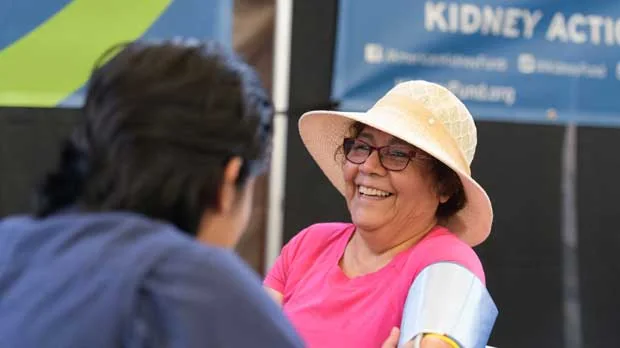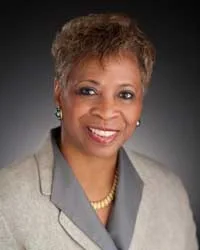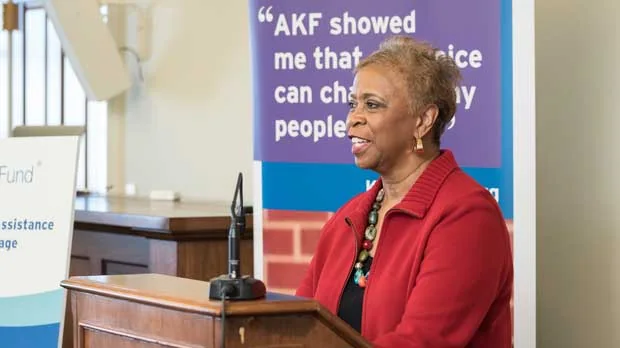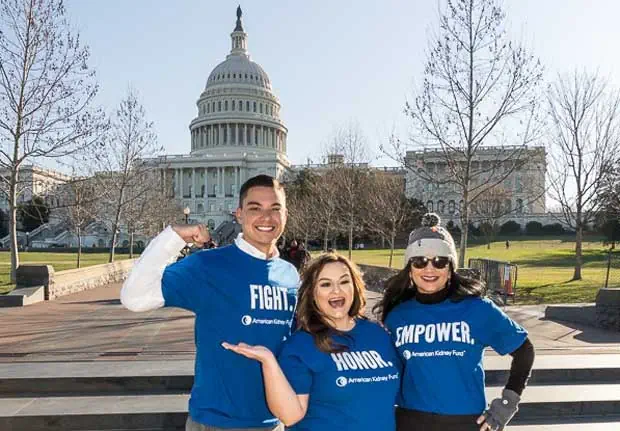
By Priscilla Rodriguez and Alexandra Fradelizio | m/Oppenheim Media Writers
Across the U.S. nearly 100,000 people who are living with kidney failure are on the waitlist for kidney transplants, yet just 22,000 people received a transplant in 2018.
Some of those waiting are lucky enough to receive a living organ donation from a family member or friend, or even a stranger, while others are able to receive one from a deceased organ donor.

“But the bottom line is that the number of organs needed is far more than the number that is available,” says LaVarne A. Burton, President and Chief Executive Officer of the American Kidney Fund (AKF) based in Rockville, Maryland.
Burton has been with the organization since 2005, working to build up a suite of programs that help to educate the public on kidney health and the causes and risk factors of chronic kidney disease.
Today, 30 million Americans are living with kidney disease. Kidney disease is a silent killer—it is the 9th leading cause of death in the U.S. and 96 percent of people with the early stages of the disease do not know they have it.
“And that’s completely unacceptable,” says Burton, who explains that half the battle for the American Kidney Fund is teaching people to understand why kidneys are important and what the 1 in 3 U.S. adults who are at risk for kidney disease can do to prevent it.
While it may be obvious, kidneys are an important part of the body and essential to human life. Kidneys essentially serve as the body’s natural cleaning system, removing waste and excess fluid from the blood, controlling blood pressure, and other important functions. So when someone’s kidneys begin to fail, it often means that normal functions, like eating or drinking, need to be adjusted because the kidneys cannot do their job effectively anymore. If a person’s kidney disease progresses to kidney failure, they will have to begin dialysis or receive a kidney transplant. In these cases, there is no alternative for survival.
Once a person is in kidney failure, it becomes very hard to lead a relatively normal life. Daily activities, like going to work, can become nearly impossible as the person will have to attend dialysis three times a week, every week, and spend much of their time not in dialysis recovering from the treatment.
In order to prevent people from ever getting to this stage, Burton explains that AKF works vigorously to make its educational, prevention, and networking resources available to the public. Much of the organization’s work is about increasing awareness and spreading the knowledge so that people can better understand their own risk and how they can manage their health.
Unique among nonprofits, the American Kidney Fund is equipped to help people whether they are at risk for kidney disease, living with the disease, or are living with kidney failure and need help to pay for medical costs. From prevention services and running the nation’s largest free kidney health screening program, to providing financial assistance to dialysis and kidney transplant patients, AKF provides vital resources to at-risk individuals, patients, and caregivers.

As a publicly supported nonprofit, AKF depends entirely on support from individuals, foundations, and corporations to run its programs. AKF spends 97 cents of every donated dollar on programs, earning its top ratings from Charity Navigator and other charity watchdog groups.
At times, AKF’s work can get very personal. One of AKF’s long-standing and memorable connections is with a patient named Ariel who lives in Houston. Ariel is living with kidney failure and receives dialysis three times a week – a process that takes a few hours with each visit. When Hurricane Harvey hit Houston in 2017 and flooding affected the entire region, Ariel was unable to leave her apartment building and in turn was unable to reach her dialysis clinic.
“We had developed a relationship with her and she called Alice (an AKF employee) to say ‘I don’t know what to do,’” said Burton.
“[Alice] spent her week just being there for her and talking her through it all, and eventually she got out and was able to get to the hospital.”
After some complications with overcrowding, Ariel was able to finally receive the treatment she needed, but throughout it all, AKF was a reliable source of knowledge, comfort, and support.
“That’s what is so impactful about getting to know patients on an individual basis and understanding their stories and how [AKF] fits in with helping them to deal with their individual situations,” says Burton.
The connection and direct impact with the lives of patients is a huge motivator for Burton.
“It’s the reason I’ve stayed here for the length of time that I have,” she says, and it’s this reason the staff of the AKF is motivated to do the work that it does.
Aside from offering key financial support to patients who might not otherwise be able to afford the health care they need, the American Kidney Fund runs programs and campaigns designed to help patients live their best lives with kidney disease and provides them with ways to connect with other people who are also living with the disease. One of those is AKF’s nationwide Advocacy Network with 11,000 patient Ambassadors working to influence public policy in a positive way.

Right now, AKF is working on improving legislation across the U.S. to make organ donation an easier process for those who want to be organ donors.
“We are trying to make sure that when an individual is willing to give an organ that there will not be obstacles in their way,” says Burton.
Often times, potential organ donors experience quite a bit of hesitation and are concerned about their job status and possible future discrimination by life, disability, and long-term insurance companies. The fear of taking too much time off and losing a job can dissuade an organ donor from donating, and in turn, another person with kidney failure runs out of time.
Due to the incredible work of AKF, so far this year, a handful of states have already signed into law legislation to protect organ donors, including Maryland, Arizona, Kansas, Arkansas, and Oklahoma.
The small yet mighty organization has another network of community members who, as Kidney Health Coaches, are helping to spread the word and knowledge in their communities to ensure more Americans are aware of the risks they face and how they can take preventative measures against the disease.
People of color are particularly at risk, explains Burton, and AKF targets these communities in its outreach and prevention efforts.
But the goal, says Burton, is that the organization will one day see its vision become reality.
“Our vision is ‘a world without kidney disease,’” she says.
The ultimate goal of AKF is to be in a situation “where people will not have kidney failure and those who have kidney disease know it and are getting the proper care that they need.”
Learn more about the American Kidney Fund and Donate.
